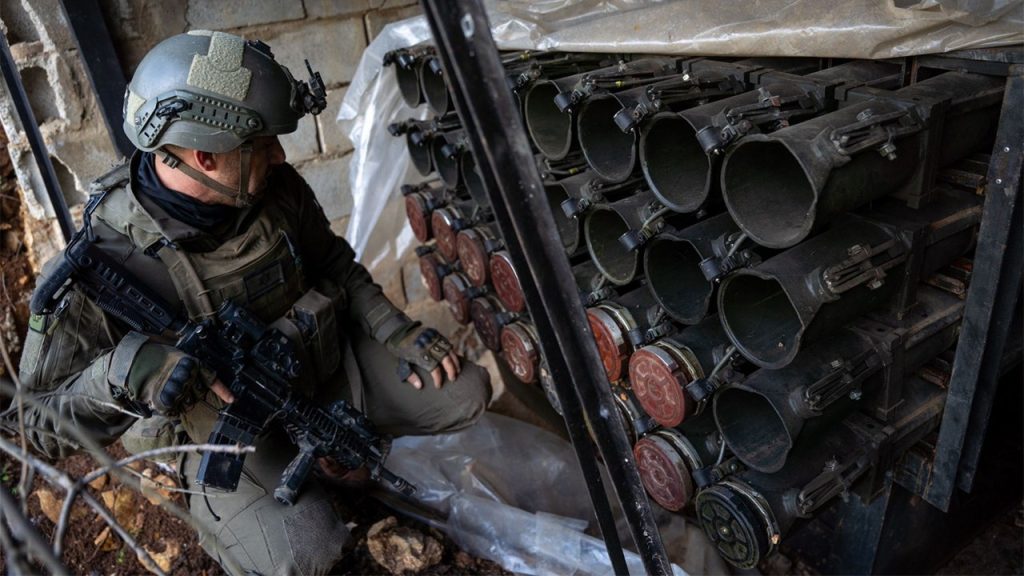The Israel Defense Forces (IDF) announced the discovery and destruction of a substantial Hezbollah tunnel system in southern Lebanon, marking another chapter in the ongoing tensions between the two adversaries. The tunnel, exceeding 300 feet in length, served as a clandestine hideout for Hezbollah’s Radwan Forces, an elite unit known for its involvement in cross-border operations against Israel. Inside the tunnel, IDF troops uncovered a cache of weaponry, including rifles, machine guns, anti-tank missiles, and surveillance equipment. The IDF’s specialized Yahalom Unit, tasked with subterranean operations, played a crucial role in clearing the tunnel of explosives and securing the confiscated weapons before the entire complex was demolished. The IDF also located additional weapon stockpiles, including anti-tank missiles and heavy machine gun emplacements, positioned near the tunnel and aimed at Israeli positions. This discovery underscored the tunnel’s strategic importance and its intended use in potential attacks against Israel.
The IDF further revealed that the tunnel network connected to a Hezbollah command center containing rockets and a significant quantity of explosives. This connection suggested that the tunnel system was not merely a hiding place but also part of a larger operational infrastructure used during the recent conflict with Israel. This revelation provided further justification, from the Israeli perspective, for the ongoing operations in southern Lebanon despite the recent ceasefire agreement. The IDF’s actions underscored their commitment to preventing Hezbollah from re-arming and regrouping after the ceasefire, aiming to disrupt any potential future threats emanating from southern Lebanon.
However, the IDF’s continued presence and operations in southern Lebanon have drawn criticism from the United Nations Interim Force in Lebanon (UNIFIL). UNIFIL has called on Israel to adhere to the terms of the November 27th ceasefire agreement, which mandates a phased Israeli withdrawal from southern Lebanon. The peacekeeping force expressed concern over Israel’s ongoing demolition of residential structures, agricultural lands, and infrastructure in the region, viewing these actions as violations of the ceasefire terms and a potential source of renewed instability. UNIFIL has urged both sides to fully implement UN Security Council Resolution 1701, which aims to establish a lasting peace in the region following the 2006 conflict.
The ceasefire agreement, brokered by the United States, requires a phased Israeli withdrawal within 60 days, coupled with Hezbollah’s retreat from positions in southern Lebanon to north of the Litani River. This reciprocal withdrawal is intended to create a buffer zone and mitigate the risk of further clashes. However, the IDF’s continued operations, justified as necessary security measures, have complicated the implementation of the agreement and raised concerns about potential escalations. The dismantling of the Hezbollah tunnel system further exemplifies this complex dynamic, with Israel prioritizing security concerns while UNIFIL emphasizes adherence to the ceasefire agreement and the need for a coordinated withdrawal.
The Lebanese Armed Forces (LAF) are expected to deploy in the areas vacated by Hezbollah in southern Lebanon, a key component of the ceasefire agreement aimed at restoring Lebanese government control over the region. UNIFIL’s call for the LAF’s deployment underscores the importance of a robust Lebanese security presence to maintain stability and prevent a power vacuum that could be exploited by armed groups. The success of the ceasefire hinges on the LAF’s ability to effectively secure the area and prevent Hezbollah from re-establishing its presence south of the Litani River.
The situation in southern Lebanon remains tense, with the IDF’s security operations and UNIFIL’s calls for withdrawal highlighting the fragility of the ceasefire. The discovery and destruction of the Hezbollah tunnel further complicates matters, underscoring the ongoing security challenges and the deep-seated mistrust between Israel and Hezbollah. Finding a balance between security concerns and the implementation of the ceasefire agreement is crucial for maintaining stability and preventing a resurgence of hostilities in the region. The coming weeks will be critical in determining whether the ceasefire can hold and pave the way for a more lasting peace. The international community remains engaged in supporting the implementation of the ceasefire and promoting dialogue between the parties to address the underlying causes of the conflict and ensure a peaceful resolution.

